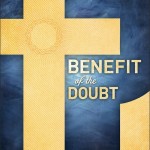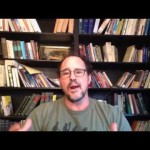We run our website the way we wished the whole internet worked: we provide high quality original content with no ads. We are funded solely by your direct support. Please consider supporting this project.

God’s Dream for the World
One of the grandest expressions of non-violent nature of God is found in Isaiah 11. Here God is dreaming of a time when his creation would be entirely free of violence. “The wolf will live with the lamb,” Isaiah says, and “the leopard will lie down with the goat.” So it will be with “the calf…the lion and the yearling,” and he adds that “a little child will lead them” (v.6). In that day, he continues, predators and their prey will eat and sleep alongside one another, for there will no longer be any carnivores. Even “the lion will eat straw like the ox” (v.7). In the end, there will be no fear between humans and animals, not even between young children and cobras (v 8). For humans as well as animals will neither “harm nor destroy” when God’s dream for creation is realized, because “the earth will be filled with the knowledge of the LORD as the waters cover the sea” (v.9).
This magnificent vision of creation in the future parallels God’s original vision for creation as it is reflected in the Genesis 1 account. God told the first couple that he had given them “every seed-bearing plant on the face of the whole earth and every tree that has fruit with seed in it… for food” (Gen 1:29). And he adds: “And to all the beasts of the earth and all the birds in the sky and all the creatures that move along the ground—everything that has the breath of life in it—I give every green plant for food” (Gen 1:29-30, emphasis added).
Talk about a passage acquiring significance in light of the cross! This passage makes it clear that God’s original plan was for the whole creation to be free of violence. This means that all violence among humans and within the animal kingdom is the result of something having gone wrong. As the passage from Isaiah makes clear, what is currently wrong is that our world is no longer “filled with the knowledge of the LORD.”
Through prophet Micah, the Lord expresses his dream that someday people,
… will beat their swords into plowshares and their spears into pruning hooks. Nation will not take up sword against nation, nor will they train for war anymore. (Mic 4:3)
When humanity is once again “filled with the knowledge of the LORD,” instruments of death will be transformed into instruments that support life, and people will no longer even be worried about the possibility of war.
What hope this beautiful anticipation of the future gives in light of the persistent threat of terror we currently live under!
In a similar way, the Psalmist declares that God,
… makes wars cease
to the ends of the earth.
He breaks the bow and shatters the spear;
he burns the shields with fire (Ps 46:9).
Here we see the Spirit of Christ breaking through to turn the warrior image of God on its head! God is indeed a heavenly warrior, but he is a warrior who “fights for peace.” God is not only non-violent. He’s passionately anti-violence! No wonder Jesus refused to call legions of angels to his defense!
Image by Will Bullas
Category: General
Tags: Character of God, Non-Violence
Related Reading

Rachel Held Evans Interviews Greg on Benefit of the Doubt
We shared an interview that Frank Viola did with Greg yesterday, and we’re thrilled to share an interview that Rachel Held Evans posted today. Rachel is very familiar with the resistance and criticism that comes when dearly held beliefs are challenged. We feel like she is a kindred spirit in this regard. We hope you’ll…

What Would You Do If Someone Attacked Your Family?
The New Testament commands us never to “repay evil with evil” but instead to “overcome evil with good” (Rom.12:17; cf. I Thess 5:15; I Pet 3:9). Jesus said, “Do not resist an evildoer. But if anyone strikes you on the right cheek, turn the other also”(Mt 5:39). He also said, “Love your enemies, do good…

Thankful for the Passion of God
The classical view of God has held that God is impassible, meaning he is above pathos (passion or emotions). The main reason the church came to this view was that, following the Hellenistic philosophical tradition, they associated emotions with change while believing God was above all change (immutable). Moreover, experiencing emotions implies that one is affected by…

Podcast: What is Violence?
Greg takes a closer look at what violence is. Then he bullies Dan. http://traffic.libsyn.com/askgregboyd/Episode_0174.mp3

Paul’s Blinding of Elymas: A Response to Paul Copan (#5)
In the first four posts in this “Response to Copan” series, I attempted to refute Copan’s claim that my non-violent understanding of love, as advocated in Crucifixion of the Warrior God (CWG) and Cross Vision (CV), conflicts with Paul’s quotation of violent Psalms, the praising of the faith of warriors in Hebrews 11:30-32, the longing…

How Should We Respond to Bullies?
Greg answers a question from parents as to how their child should respond to a bully.
